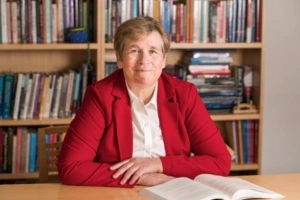Faculty Expert
Briana Nichols, left, and Jessica Peng, right, have both received prestigious National Academy of Education/Spencer Dissertation Fellowships.
Two Penn GSE doctoral students, and students pursuing Ph.D.s in Penn’s departments of History and Sociology, have been named 2020 National Academy of Education/Spencer Dissertation Fellows.
The four students each received a prestigious fellowship, which supports individuals whose dissertations show potential for bringing fresh and constructive perspectives to the history, theory, analysis, or practice of formal or informal education anywhere in the world.
These scholars are researching an array of topics including young people in Guatemala fighting to remain in their communities, how education is valued in Indonesia, how work by individuals and families with disabilities changed the way disabilities are viewed in American society, and the role of schools in managing the movement, sound, and shape of children’s bodies.
Additionally, Higher Education assistant professor Amalia Daché received an NAED/Spencer Postdoctoral Fellowship to further her research exploring geographic and structural factors that have historically inhibited access for students on the margins of race and class.
Penn’s National Academy of Education/Spencer Dissertation Fellows are:
Briana Nichols is a joint Ph.D. candidate in Penn GSE’s Literacy, Culture, and International Education Division and Penn’s department of Anthropology. As a dual language middle school teacher in the Chicago Public Schools, Briana witnessed her students grappling with disjunctures between the dominant narrative focusing on trauma and suffering pre-migration, and their actual lived experiences in their countries of origin. This tension inspires her inquiries into the larger implications of erasure in migration discourse. Departing from scholarship that focuses on future-making in terms of youth mobility, her work centers on youth who fight to remain in their communities. Nichols examines the intersection between transnational development, international migration, and indigenous youth educational striving in Guatemala, and explores the everyday practices of young people as they attempt to create futures of non-migration.
Her dissertation, Waiting for Change: Indigenous Youth Striving for Non-Migration in Guatemala, asks, in contexts of extreme migration, how do young people come to imagine the possibility of a non-migratory future? What strategies do young people employ to attain these futures? And, ultimately, what social, material and institutional practices structure the realizability of non-migration? Based on ethnographic fieldwork in Guatemala and the U.S., this study examines Guatemalan indigenous youth who participate in education-based migration prevention programs. It explores how young people navigate emergent tensions between local knowledge and developmentalist notions of progress in their everyday practices of future-making.
Jessica Peng is a joint Ph.D. candidate in Penn GSE’s Education, Culture, and Society program and Penn’s Anthropology department. She has broad research interests in the social production of difference, processes of social and geographic mobility, and the workings of education reforms. Her current research examines Indonesia’s efforts to become a top global economy, key to which is a focus on developing “skilled” youth labor forces across some of the most marginal areas of the country. The study analyzes how the vocational training of young people have come to be viewed as an “infrastructural” prerequisite for national development and, more specifically, how efforts of national policymaking and local implementation orient youth to pursue particular kinds of futures. This project has been supported by a Fulbright-Hays Doctoral Dissertation Research Abroad Fellowship, an American Institute for Indonesian Studies-Council for American Overseas Research Centers Fellowship, and a University of Pennsylvania Graduate and Professional Student Assembly-Provost Fellowship for Interdisciplinary Innovation.
Her dissertation, Archipelagic “Potentials”: Infrastructures, Education, and Labor in Indonesia, discerns how linkages between new infrastructures, emergent markets, and novel educational practices shape conceptualizations of potentiality at different levels of Indonesian society. It further explores how these conceptions of potentiality guide the terms through which social actors pursue their futures in the areas of education and labor. In the aggregate, the study shows how various ideas of potentiality—formed through people’s descriptions of latent capacities, warnings against undesirable outcomes, and aspirations for particular futures—give vocational education new cultural meanings in contemporary Indonesia. It also offers broader theoretical insights into how potentiality serves as a key mechanism through which education problems, solutions, and visions are formed.
Chelsea Chamberlain, a doctoral candidate in Penn’s History department, explores the years 1890-1930 in a dissertation that argues that disabled people, their families, and their teachers were key participants in the development of medical, political, and educational approaches to mental and “moral” disabilities.
Peter Francis Harvey, a doctoral candidate in Penn’s Sociology department, investigates the role of schools in managing the movement, sound, and shape of children’s bodies. For his research, Francis Harvey used three years of ethnographic observation conducted in two racially diverse elementary schools, one predominantly upper-middle-class, one predominantly working-class.









